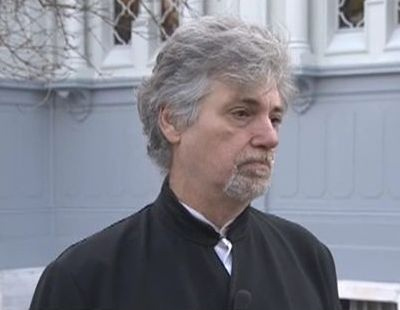On January 7, the fully restored Bulgarian church "St. Stephen", also known as the Iron Church, located on the shore of the Golden Horn in Istanbul, will be officially reopened. The religious ceremony will be conducted jointly by Ecumenical Patriarch Bartholomew I and Bulgarian Patriarch Neophyte. The church will open doors in the presence of Bulgarian Prime Minister Boyko Borissov and Turkish President Recep Tayyip Erdoğan, as well as ministers of both countries, clergy and over 1,000 guests.
The restoration of this unique monument of Bulgarian historical heritage took 6 years and costs reached 15 million Turkish Lira (nearly 4 million euros), provided by the Istanbul Municipality. More about the church and the spiritual life of the Tsarigrad Bulgarians from priest Angel, who has been serving the Orthodox community in the megalopolis for more than 13 years now.
 "Repair works in the church started in 2011 and were supposed to finish for a year but because of deep corrosion, restoration finished in 2017. Everything in the church has been restored and repaired. Old ornaments were removed and those that could be used were restored, while those that could not be completely restored were replaced by new ornaments, produced, according to the original plans preserved by the Austrian company of Rudolph Philip Waagner in Vienna."
"Repair works in the church started in 2011 and were supposed to finish for a year but because of deep corrosion, restoration finished in 2017. Everything in the church has been restored and repaired. Old ornaments were removed and those that could be used were restored, while those that could not be completely restored were replaced by new ornaments, produced, according to the original plans preserved by the Austrian company of Rudolph Philip Waagner in Vienna."
This year St. Stephen's Cathedral celebrates its 120th anniversary. It has an enormous historical significance for Bulgaria – the process of getting independence for the Bulgarian Church started in this church. Knyaz Stefan Bogoridi donated the site to the Bulgarian community in Istanbul for the construction of a temple. Now the church is once again ready to host services and welcome believers. The unique church also attracts many tourists to the city.
"There are many tourist sites in Istanbul that are attractive to tourists and along with the ancient historical monuments, the church of St. Stephen is a very important site,” priest Angel points out. “We should not forget that in 2007, a large study by 100 Turkish architects was carried out and even though the church was in very bad condition at that time experts said this was the most beautiful church on the territory of Turkey. Now after its restoration the temple will be a jewel in the crown of this city."
In the 19th century when the church was built, the number of Orthodox Bulgarians in Istanbul reached 50,000 people. Today they are about 1,000. Do they gather in the church on holidays and what about the newly established Bulgarian school in Istanbul?
"My parishioners, unfortunately, are few and are mostly older people. Most of the people go to the ‘St. Ivan Rilski’ chapel in Istanbul’s Şişli district. That's where we have most of our services. Services in "St. Stephen used to take place only a few times during the year because of the bad condition of the building back then. Services usually took place on Epiphany and the temple’s feast, but people always come here with pleasure. They light a candle, pray and praise God, and thus keep the Bulgarian spirit in their families. The creation of the Bulgarian school two years ago was at the initiative of the Consulate General of the Republic of Bulgaria in Istanbul. There are three age groups in it: children from the first to the fourth grade; a class of 6th and 8th graders; and a group of people over 35 who want to learn Bulgarian language. The school is mainly visited by children of people coming from Bulgaria and children of Bulgarian emigrants,” priest Angel says.
English: Alexander Markov
The year 2024 was marked by political instability and confrontation - not so much over ideas for solving Bulgaria's long-standing governance puzzle, but rather over personal egos and individual agendas. This turbulent year shaped the political landscape,..
The clock on the facade of the State Puppet Theatre in Stara Zagora has long been a symbol of the city. It was set in motion in 1977 and is unique on the Balkan Peninsula. The theatre recently shared details about the clock on its Facebook page after..
"Every day, we should think about peace and the messages that politicians send,” journalist Tsvetana Paskaleva, who has been living in Armenia for 30 years, says. "The situation around us and in neighbouring countries is unstable and..
Novo Oryahovo is a village in north-eastern Bulgaria. It is located in a picturesque corner in the municipality of Dolni Chiflik - 2 km..
The Botanical Garden's Tropical Greenhouse will be open to visitors from 16 to 26 January, every day from 10 am to 4 pm. More than 30 varieties of..
Methodological assistance, teacher training, meetings and educational programs in Bulgarian language and culture for students – these are just some of the..

+359 2 9336 661
